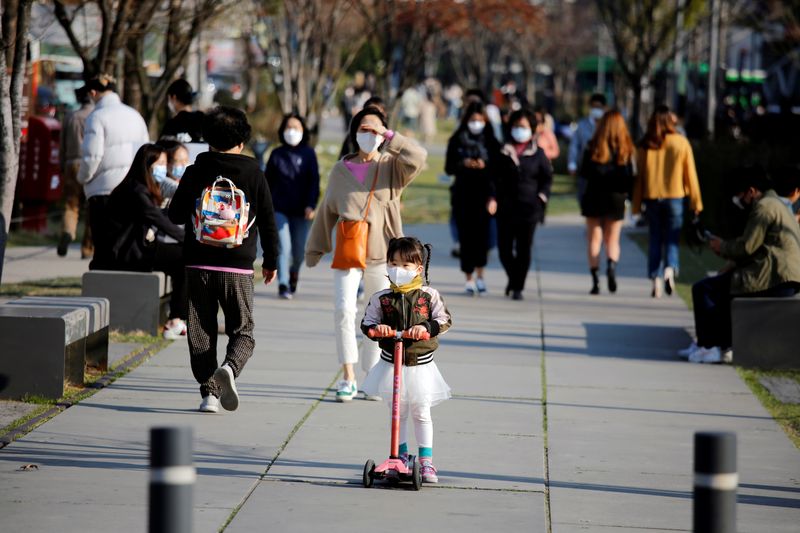By Nancy Lapid
(Reuters) - The following is a summary of some recent studies on COVID-19. They include research that warrants further study to corroborate the findings and that has yet to be certified by peer review.
Breakthrough infections may be less contagious
Fully vaccinated individuals who get infected with the coronavirus spread the infection to fewer people and are contagious for less time compared to people who are partially vaccinated or unvaccinated, a small study from South Korea suggests.
In 173 hospital workers with COVID-19, including 50 who had breakthrough infections, researchers found that the virus had been transmitted to others in the hospital by 7% of the vaccinated group compared with 26% of the unvaccinated, even though the two groups had similar viral loads when diagnosed. In a separate group of 45 people with mild COVID-19 who were being quarantined, the researchers observed shedding of infectious virus particles for four days in the six people who had been fully vaccinated, 8 days in the 11 partially vaccinated people, and 10 days in the 28 unvaccinated people. All of the infections were acquired before the Omicron variant was circulating, the researchers noted on Tuesday in JAMA Network Open https://jamanetwork.com/journals/jamanetworkopen/fullarticle/2792598.
"Data from this study provide important evidence that despite the possibility of breakthrough infections, COVID-19 vaccinations remain critically useful for controlling the spread of SARS-CoV-2," the researchers said.
Vaccine protection wanes faster for cancer patients
COVID-19 vaccines are effective in most cancer patients, but less so than in the general population and the efficacy wanes more quickly, according to a large study.
When the Delta variant of the coronavirus was predominant in the UK, researchers tracked 377,194 individuals with cancer and more than 28 million people without malignancies. After two doses of a COVID-19 vaccine from Pfizer/BioNTech or AstraZeneca (NASDAQ:AZN), overall vaccine effectiveness against infection was 69.8% in the general population and only slightly lower, at 65.5%, for cancer patients, the researchers reported on Monday in The Lancet Oncology https://www.thelancet.com/journals/lanonc/article/PIIS1470-2045(22)00202-9/fulltext. Three-to-six months later, however, vaccine effectiveness was 61.4% in the general population but had dropped to 47% in the cancer group. The vaccines were 83.3% effective against COVID-related hospitalization and 93.4% effective against death for cancer patients, but this protection also waned within three-to-six months, the researchers said. Vaccine effectiveness was lowest and waned most quickly in people with lymphoma or leukemia. In cancer patients who had received chemotherapy or radiotherapy in the past 12 months, vaccine effectiveness was lower and waned faster than in cancer patients who did not receive treatments within the past year.
"This study... highlights the importance of vaccination booster programs and rapid access to COVID-19 treatments for people undergoing cancer treatments," study leader Peter Johnson of the University of Southampton said in a statement.
MRI technique may yield clues to long COVID breathlessness
In people with lasting breathlessness after COVID-19, a special type of magnetic resonance imaging (MRI) reveals lung abnormalities that traditional imaging techniques do not detect, a small study shows.
In 23 patients with shortness of breath lasting for months after COVID-19, including 11 who had not required hospitalization, the researchers performed hyperpolarized xenon 129MRI, or Hp-XeMRI, to look for abnormalities in gas exchange - the way oxygen and carbon dioxide move between the lungs and the blood. All participants had normal or near normal CT scans and lung function tests, but in both groups, Hp-XeMRI showed abnormalities in gas transfer, the research team reported on Tuesday in Radiology https://pubs.rsna.org/doi/full/10.1148/radiol.220069. They cannot explain the abnormalities, and they do not know for sure yet whether the abnormalities are actually contributing to patients' symptoms. But shortness of breath is among the most common symptoms reported by people with long COVID, and the researchers hope the findings in this small study will be a clue to the cause.
"Using Hp-XeMRI may enable us to further understand the cause of breathlessness in long COVID patients, and ultimately lead to better treatments to improve this often debilitating symptom," study co-author James Grist from the University of Oxford said in a statement.
Click for a Reuters graphic https://tmsnrt.rs/3c7R3Bl on vaccines in development.
